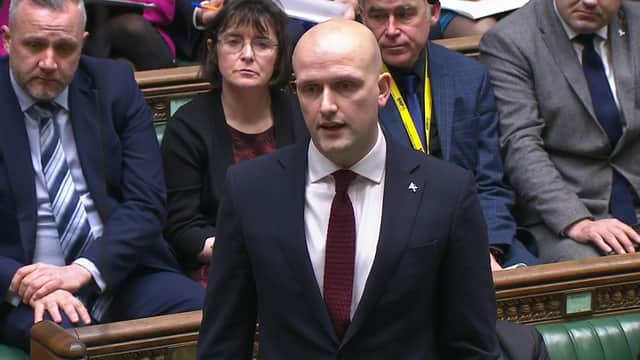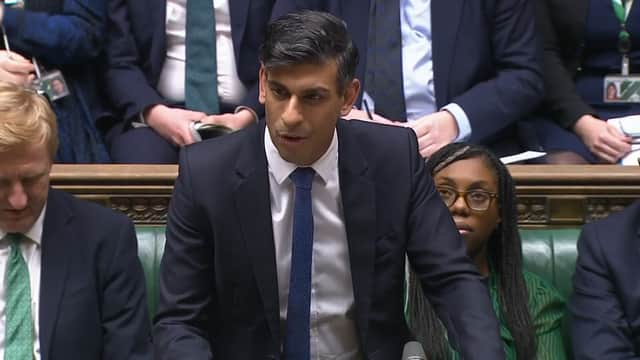Israel-Gaza: how did the UK vote in the UN resolution on ceasefire? Rishi Sunak response
and live on Freeview channel 276
Rishi Sunak has defended the government’s decision not to vote for a ceasefire in Gaza at the UN General Assembly.
Nations voted unanimously in favour of a ceasefire in the war-torn part of Palestine, with 153 countries from the 193-member body backing the resolution. The Prime Minister was quizzed on the UK’s stance at PMQs by SNP leader Stephen Flynn.
Advertisement
Hide AdAdvertisement
Hide AdFlynn told the Commons: “If the current actions of the Israeli government continue then it is estimated that more than 1,400 more children will die between now and Christmas day. Now in the United Nations last night our friends in France, in Ireland, in Canada, in Spain, in Australia - they joined with 148 other countries to vote for courage, care and compassion for a ceasefire … how can the Prime Minister possibly explain that 153 nations are wrong yet Westminster is right?”
Sunak told the Commons that the UK supports a “sustainable ceasefire”. He added: “We are deeply concerned by the devastating impact of the fighting in Gaza on the civilian population. Too many people have lost their lives already, and this is something that I have stressed personally to Prime Minister Netanyahu last week. What we are doing practically is to get more aid into Gaza.”
The Prime Minister said that during a conversation with Netanyahu last week, he “pressed him on opening up” the Kerem Shalom crossing, a Gaza border point that lies at the junction of both Israeli and Egyptian jurisdiction, to allow more aid into the enclave.


Attacks by Hamas and other Palestinian militants in October, which saw 1,200 people killed and more than 240 taken hostage, has triggered a bloody two-month war between Israel and Hamas. Tel Aviv’s air and ground offensive has resulted in the deaths of more than 18,400 Palestinians, mostly civilians, according to Hamas.
Advertisement
Hide AdAdvertisement
Hide AdNearly 85% of Gaza’s population of 2.3 million have been forced to flee their homes, and much of the northern part of the territory has been heavily shelled. On Tuesday, US President Joe Biden said he had told Netanyahu that Israel was losing international support because of its “indiscriminate bombing”.


How did the UK vote in the UN’s Gaza ceasefire resolution?
The UK abstained from voting on the UN General Assembly’s resolution for a ceasefire in Gaza along with 23 other countries. The government has consistently called for humanitarian pauses in the conflict instead of a full ceasefire, while saying “Israel has the right to defend itself”.
Unlike UN Security Council resolutions, General Assembly resolutions are not legally binding. But the assembly’s messages “are also very important” and reflect world opinion, UN spokesperson Stephane Dujarric said.


Why did the UK abstain from the Gaza ceasefire vote?
After PMQs, NationalWorld asked the Prime Minister’s official spokesman why the UK abstained from the UN vote. He responded: “We are gravely concerned about the desperate situation in Gaza, the scale of civilian deaths and displacement cannot continue. We continue to press both in the UN and directly with Israel, as the Prime Minister has set out before, for unhindered humanitarian access and substantive, repeated humanitarian pauses that allow aid to enter and British nationals to leave.
Advertisement
Hide AdAdvertisement
Hide Ad“Of course, we do want to see a peaceful resolution to the conflict - that will ultimately be a lasting ceasefire. But that needs to be agreed and abided to by all sides.” He added: “We are deeply concerned by the high loss of civilian life in Gaza.”
The British government is looking at using the navy to get humanitarian aid into the strip, which is under constant bombardment from Israel. The spokesman said: “We are still exploring the possibility of using maritime routes to deliver aid into Gaza. We were successful in opening up an additional check point.”
Labour declined to comment on how it would have voted at the UN if it was in power. A spokesman said: “We have serious concerns about the loss of civilian life there has been, about the bombing that we saw in the first phase of Israel’s response in Gaza. We urged that the second phase shouldn’t be conducted in the same way … of course there are concerns about the civilian casualties.”
Ralph Blackburn is NationalWorld’s politics editor based in Westminster, where he gets special access to Parliament, MPs and government briefings. If you liked this article you can follow Ralph on X (Twitter) here and sign up to his free weekly newsletter Politics Uncovered, which brings you the latest analysis and gossip from Westminster every Sunday morning.
Comment Guidelines
National World encourages reader discussion on our stories. User feedback, insights and back-and-forth exchanges add a rich layer of context to reporting. Please review our Community Guidelines before commenting.
